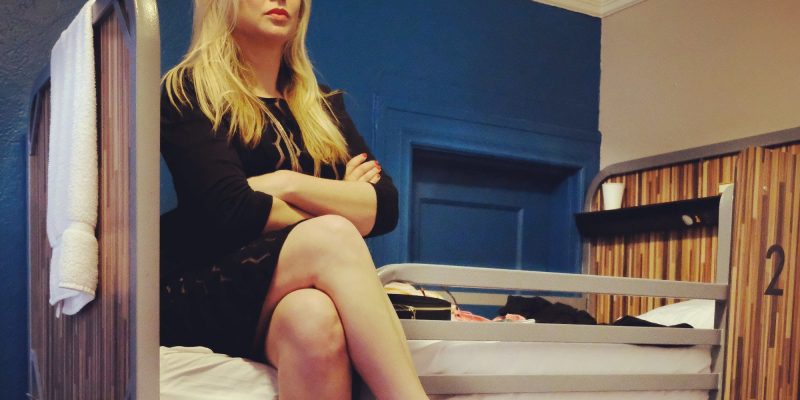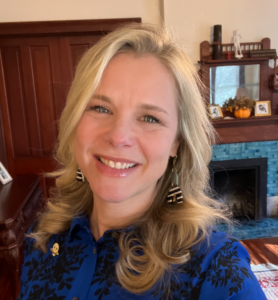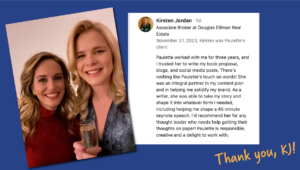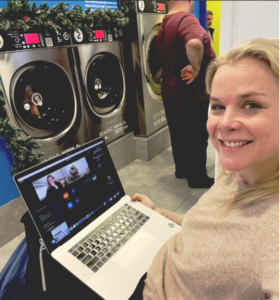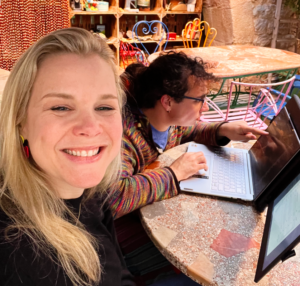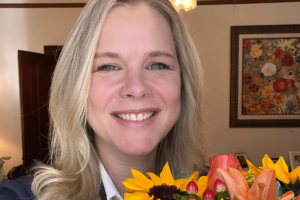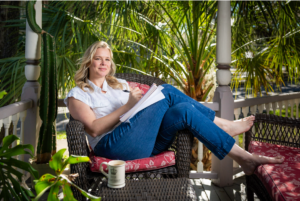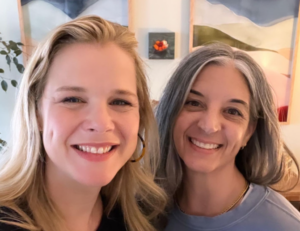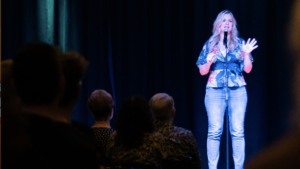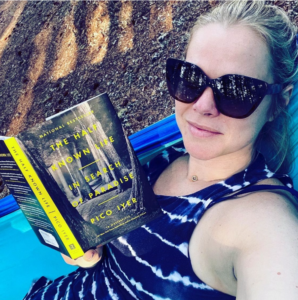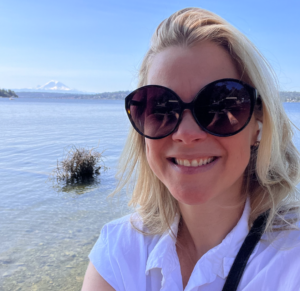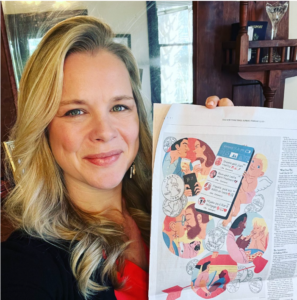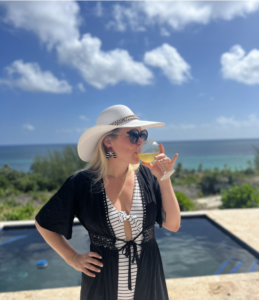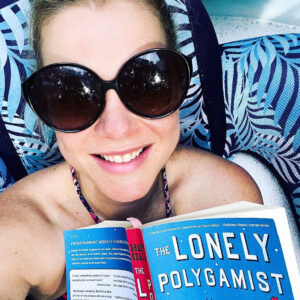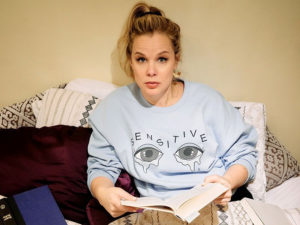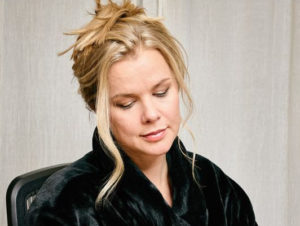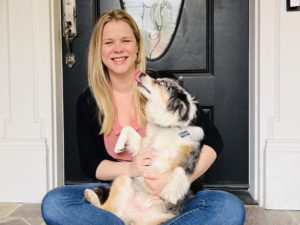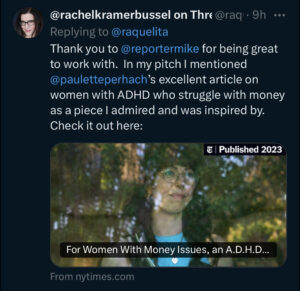When I ordered a wireless keyboard for my laptop, it had to have a 10-key, that little grid of numbers next to the regular keyboard because the joy of my 10-key is my little secret.
I learned to clack my little fingies on that board in 2010, in a three-foot wide cubicle shoved next to a sink at a temp job I did not want to have.
I was powerless to choose to not have that job. I was powerless to use the days spent doing data entry and crying silently behind my padded dividers to find a better job. When one of the supervisors came in and yelled at us like puppies that had piddled on the floor, I was powerless to tell her to fuck off.
In that cubicle was where I discovered I’m Not Staying Here energy. I said to myself that I was here, and I didn’t like it, but I was not staying. So how was I going to move forward?
I would learn to touch type on the 10-key. That was the tiny step forward, a little skill I was using this job to learn, a stumble-step toward something better than this.
It’s the reason I smiled when later, as an executive assistant at that job, I got to hear that manager get reamed out by the CEO for her abusive practices. It’s why, five years later, I smirked typing in the numbers for the million-dollar deals I helped write proposals to win.
And if you are broke and you want to be a writer and you don’t know how to move forward, today is the day I hope you find your Not Staying Here Energy.
This guide is for you if you want to move toward being a writer while also moving toward stabilizing your financial future.
Psst: This site uses affiliate links.
Moving Forward with The Stockdale Principle
Admiral Jim Stockdale was captured during the Vietnam War and taken to a prisoner-of-war camp. He was not released that year, or the next, nor the next, nor the next, nor after the first session of torture, or the second, or the third.
He spent eight years of his life in that camp. He was tortured almost two dozen times.
But he got out, got to live at home with his family again, and studied Stoic philosophy at Stanford.
“I never lost faith in the end of the story,” he told an interviewer. “I never doubted not only that I would get out, but also that I would prevail in the end and turn the experience into the defining event of my life, which, in retrospect, I would not trade.”
“Who didn’t make it out?” asked the interviewer.
“The optimists.”
It might seem like what he described for himself was optimism, but there’s a difference. The optimists kept saying they’d be out by Christmas, but then Christmas would come and there would be no rescue. Then it was Easter, same thing.
“This is a very important lesson. You must never confuse faith that you will prevail in the end — which you can never afford to lose — with the discipline to confront the most brutal facts of your current reality, whatever they might be.
Stockdale didn’t hope to be rescued, he prepared to battle the battle he was fighting in reality, training his men in how to approach torture and implementing a system of communication with tapping.
Stockdale Principle Steps:
- face and accept whatever financial reality you’re in.
- begin the practice of having faith that you will do whatever it takes to get where you want to go.
When it comes to the writer’s life, let’s face that we live in a country that doesn’t support its artists, that ties physical safety to wealth and traditional employment, and that writing requires a lifestyle where many hours of your day will go to unpaid focus.
That is the game we’re playing. So let’s play it.
Three key methods for becoming a writer if you’re broke
By “become a writer,” I mean figure out a way to live in which you are dedicating hours of your life to reading and writing as well as publishing your work, without that practice putting you in financial danger.
If you want to become a writer but you’re broke, three areas will help you achieve that goal.
Focus on things you can do to:
- move toward a writing life without costing you anything but time.
- earn more money per hour in the future.
- keep more of the money you earn.
1. Advance your writing career without spending money
Network everywhere.
Networking can cost money in the form of conference travel, drinks out, and entry to classes. Focus on where networking is free. Social media gives you the opportunity to connect directly with the writers you love. Online writers’ groups provide a place where you can ask questions and get bite-sized mentorship. When a major writing conference is going on, follow the hashtag to see what and who people are talking about.
I think networking is one of the most important practices that those of us who grow up broke have no idea about. Who you meet and cultivate relationships with matters immensely.
When you love someone’s work, tell them. When you have a question, ask it.
Create a no-cost accountability measure.
I call them fake outs, fake stakes to get you writing. This can be a generative group, where you read and get feedback. I host a meditation and freewrite group that people can attend for free, as one example. As a newer writer, the most important practice you can cultivate is writing badly, a lot.
You can, and I do, pay people to keep you accountable. I have my own writing coach, I love taking classes, I relish events that inspire me. But if the choice is between doing those and paying for your health insurance, you’ve got to keep yourself alive.
Always ask if there’s a financial aid option.
So many programs offer financial assistance, you just have to ask. If you think you can’t afford something, just make sure you check. People want to help you succeed, and they may know a way you can get something without having to pay.
One example that came more from my work life is this: In 2011, I was super broke and needed a job so bad. I contacted a career coach and basically said Hey I’m super broke but is there any advice you could give me? She recommended the book The Overnight Resume. I read it, used it, and got the job that helped me pay off my student loans over the next three years, save up for grad school, and start to take writing classes at Hugo House.
2. Earn more money per hour in the future
Right now, I get up at 5 a.m. to work on my novel, and am paid $0 per hour for the first two hours of my day. Then at 7 I do my little meditation, where I get what’s essentially an honorarium of $15. Then I work out with my trainer, which costs $10. I attend the 9:30 A Very Important Meeting, which I use as my reading time. Then I shower and eat. It’s lunch time, and I have thus far in my day earned about $0.
From here, I do not work 8 hours. I don’t have 8 hours of focus left. I have about five. And I’m able to do this because I’ve spent the last ten years figuring out how to make more per hour. On the low end, I get $84/hr from one corporate client writing their blog, $100/hr from another to write website copy for their client. On the higher end, I charge per piece (always a better idea if you can swing it), and can get about $200/hr.
When you learn how to earn more per hour, you realize money buys time. That’s when earning more becomes your favorite game.
Point all your time toward education
Education is the hinge between where you are and where you want to go.
To get your time to be worth more, you have to learn how to pack more value into that time. A decade ago, I could have stared at a story for a week and not been able to make the improvements I can make now in an hour. I didn’t know as much.
If you’re a broke writer, your education will have two main threads: finances and creativity. For example, my goal this year is to read 12 business books and 12 writing books.
Get your education for free
When a writer gets up and talks about how they see or practice one aspect of writing, that’s called a craft talk. It’s what I’ve paid thousands of dollars to sit in on as an MFA student. Luckily for you, there are also a ton for free on YouTube.
When you have the money, which you will in the future, classes and a coach will help you get personalized curriculum. But for now, you can learn everything for free.
As the Queen’s Gambit may have reminded you, education is a door that has only recently swung wide open. No one can keep you out. You don’t need a grumpy old man to teach you, and no one can take it away.
Become very concerned with how money is made.
Earning good money is fun. It’s also a skill. Being professional, asking for a raise, negotiating: these are all part of this skill. You can’t afford to leave money on the table at future opportunities.
Money, gross!
We artists have such a weird relationship with money. If this is you, start with the books From Monk to Money Manager and The Soul of Money.
Money is a form of power. Power? I’m a writer! Shh, listen. A healthy amount of power feels good. Power to pay your bills, power to take care of yourself, power to control your time and point it toward creating beautiful work.
So we’re aiming for a healthy level of power over your life. As Doug Lynam says in From Monk to Money Manager, he wants you to be a little bit wealthy.
3. Keep more of the money you earn
Use the free.
Fall in love with the free things around you. There’s something called the mere-exposure effect, which means that the more times you’re exposed to something, the more you come to enjoy it. The park, the beach, the forest, the free. Make a habit of it.
One of the things I did wrong was I gave myself an Apeshit Season. My partner at the time and I both had good jobs, I paid off $20,000, and I knew I wanted to quit and being a writer soon. So I took advantage of that DINK life and got that fucking artisanal goat cheese at the co-op. I bought that handmade journal. I treated myself to the farmer’s market chicken curry.
And now I find that I’m always trying to get back there. I ripped off a seal I should have left in place. It’s like when this dessert place moved in two blocks away from me, and the tag line on their sign said, “Molten Chocolate Cakery.” I knew I must never go in there, because if I did, it would be a question every day. I’d come home smelling of chocolate, molten crumbs stuck in my neck creases, and my partner would have been like “NOT AGAIN PAULETTE!”
I wish instead I’d taken it on as an identity: I want to dedicate myself to writing, so I buy the medium shit. Not the cheapest, not the best. Medium. Medium is good enough.
The Library is your friend
Dammit, I love buying books, looking at books, and writing in books. But it’s best, as a broke writer, to borrow them from the library.
Yes, you can find books at the thrift store, but even then there’s a long-term cost to accumulating books that I didn’t think of when I was starting out: the space to store them. Once you buy them, it’s so hard to get rid of them.
I’ve replaced my highlighter with post-it flags I can remove before returning the book. I take photos of my favorite lines to keep on my phone and never look at again.
If I were starting out as broke as I was when I started out, I’d become best friends with the librarian and make that my book home. If I were rich, I’d have a library that required a railed ladder. But I’m a writer in a society that could take or leave writing, living in one of the nation’s most expensive cities, so I use these library services my taxes contribute to. Libraries also provide audiobooks, magazines, and some memberships for free.
Remember that in a lot of places in the world, they don’t have libraries. That’s part of the awareness of what it means to be broke rather than poor.
Learn how to barter.
Money is only one form of value, and when you learn to recognize and leverage other forms of it, you’ll feel more powerful to get what you want in life.
Time, skills, knowledge, attention, sex, connections: these are all forms of value. Someone might trade money for any one of these. You might trade any one of these for money. But you can also trade among them.
Here are some bartering exchanges I have going on:
- One of my coaching students is a personal finance coach. After her initial 10-week program, we set up an ongoing exchange where she coaches me in personal finance for 30 minutes a week, and I edit and coach her on 1,000 words of her memoir once a week.
- I took a course from a CFO who wanted my feedback. The design could use some work, so I offered to help him fix it in exchange for him CFO-ing my business a little this year. (We’re still working out the details.)
You might notice a theme here: I’m terrible at cash flow management but great at writing and design.
Without almost any skills, you could barter your time to provide admin support or research for a writer you admire in exchange for them critiquing your work for you.
Here are some tips for bartering:
- Find out what the other person wants. You might think they need someone to research their articles, but they’d really just love to have someone make a meal plan for them. Who the hells knows. Ask them what they’re struggling with and what their goals are, then see if you can do anything to meet them.
- Do a trial period. Commit for just 1-3 months at first to see how it goes. This also helps the other person feel there’s less risk in giving it a try.
- Put everything in writing. Come up with a simple doc that describes your agreement and share it.
- Ask them how it’s going. When you’ve been working together for a few weeks, check in to see how it’s going and if there’s anything that needs to be adjusted.
The best thing about bartering is that it often morphs into a mentorship. Voila, you have a contact. You know people who know you work hard.
Keep your cost of living down.
I’m in Seattle —in love, home. But if I could do it again, I would try to fall in love with a less expensive place. For two months, I lived with my frugal godmother Vicki Robin for 1/3 of my usual Seattle rent plus helping her around the house. I could feel how much shrinking the spending beast loosened me to be creative.
In Seattle, I have to hustle, and I’ve had to learn to live in rooms, rather than houses. I love access to the energy of the city, the people I meet, the quality of the local clients, but I think about what life would be like if I had fallen in love with the fields of Nebraska instead. Just kidding. That’s not me. But if it could be you, I’d consider it. Or some kind of happy medium.
Learn to love cooking.
I’m mostly not going to tell you to start cooking for the obvious reasons. Yes, it’s cheaper. Yes, it’s healthier. Yes, going out to restaurants is paying someone else to do your chores, as Dave Ramsey says.
What I love about knowing how to cook is that it’s the easiest thing to barter. It will take you anywhere. There’s not a place in the world that someone who knows how to turn ingredients into delicious food is not a person of value.
I first learned this when I got a work-study to attend a 2-week glass bead-making class at Penland, a transformative experience. As I recall it was usually around $2,000, and I got it for $400 because I spent an hour each evening chopping vegetable and making salad for 200 people.
When I Couchsurfed in Colombia, I made my hosts Thai food and it felt a little less awkward to just be crashing.
I’ve made meals for business partners as celebrations, and a homecooked meal makes an incredible gift.
Curate a playlist (something Girl from Ipanema-esque), learn to make your favorite food, and cook in bulk so you can grab meals from the freezer more easily than ordering takeout. This will buy you time to write, help you feel healthier, and take you to places that might surprise you.
Learn to love thrifting
Do you need stuff? There’s so much stuff. So. Much. Stuff. You can keep it out of the landfill and get quality things for much less if you make it a habit to try the thrift store first.
Not for like, everything, my god. I love me a once-a-year gorgeous Nordstrom Birthday Dress.
But this morning I blew my hair dry on a thrift store hairdryer that I think is a pro one because it has a 10-foot cord, which is incredible. I’m currently wearing an Ann Taylor dress I found there.
Practice financial honesty.
Get used to talking about how much you can afford. You don’t have to make it a sob story, that you don’t have the money. Instead say something like, “I’m really trying to save up for my MFA in a few years, so I’m eating in. Want to cook something together?”
Heres the story behind the photo I used for this blog: I wanted to go to Nir Eyal’s Habit Summit. He was a freelance writing client of mine, and I thought it would be a great place to meet other clients. The conference was in San Francisco, so I was honest that the ticket was going to be a stretch. He let me barter photography for a free ticket, and I stayed in a hostel dorm to make it happen. I picked up Fender as a client.
6. Get the help you need.
The app YNAB has really changed my life. I finally understand the flow of my money. Being broke is expensive. I once got $400 in NSF fees in one three month period. We don’t have room to dick around.
Pick your life strategy
As I see it, you have pretty much two strategies. I call them small and simple vs. big and bold.
I tried to be small and simple, looking at tiny houses and thinking about living in the country.
But dammit, I’m a big and bold girl.
If I were living for the small and simple life, man things would be so much easier. I’d have fewer bills to worry about, I’d have to take on fewer clients, I’d have fewer distractions.
I tried. I tried and tried because until then, I didn’t think I could have anything else as a writer. But I am not the small and simple girl. Small and simple is not better or worse than big and bold. If you can do it, I recommend it.
But I have a personality that gallops and gobbles. I want the city, the people, the meal, the trips, the experiences. I accept that about myself. Now I just have to learn to make it work.
And that means more strategizing, earning, networking. I live in a city with higher rent, but I also have access to better-paying clients. I have the world’s best writers popping in (during normal times) to speak.
Small and simple means you’ll focus more on frugality. Big and bold means you’ll focus more on higher earning. It’s out there and it’s wild and it’s scary and it’s fun and it’s my life.

